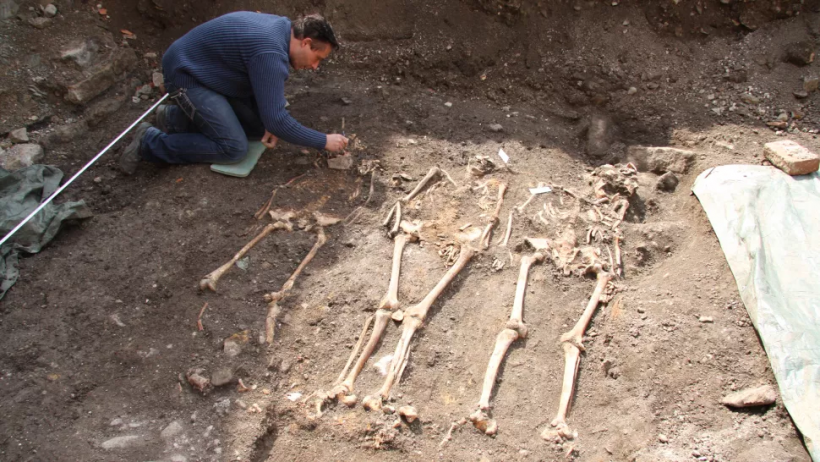Today, around two-thirds of Jews - or over 10 million individuals - are Ashkenazi, alluding to a historical origin through Eastern but also Central Europe. They generally reside in the United States as well as Israel. Ashkenazi Jews have a disproportionately high prevalence of disease-causing genetic abnormalities, including those found in the BRCA1 gene, which is linked to a higher risk of ovarian and breast cancers, as per the CDC.
The genetic load shows that the demographic was molded by a founder event, often known as a bottleneck in genetics. In other words, just a few foremothers or even forefathers contributed significantly to the present gene pool. Disease mutations inherited by the handful of founders became ubiquitous as the population developed and the offspring of these pioneers had numerous offspring.
Another of the most notable characteristics of Ashkenazi Jews nowadays is their genetic homogeneity, with essentially no discernible distinctions in ancestry across Ashkenazi Jews worldwide. Modern science has allowed it to analyze complete genomes from bones found at a reasonable cost. Researchers and 30 colleagues, largely from Israel, Germany, and the United States, examined these problems by decoding the centuries-old remnants of Ashkenazi Jews from Erfurt, Germany's medieval Jewish town.
Genomics Study of Ashkenazi Jews
Prior studies on the genomics of Ashkenazi Jews living nowadays revealed that the founder event happened during the medieval period. However, the previous geographical roots of the Ashkenazi forefathers remain unknown.
The oldest historical documents of Ashkenazi Jews date from the 10th century in the Rhineland region of Western Germany. In the centuries of centuries that followed, a rising number resided in Eastern Europe. Despite occasional persecution, the population of Ashkenazi Jews increased until reached much more than 10 million in the mid-twentieth century, before the Holocaust killed over six million Jews.
Based on a study released on Nov. 30 in the journal Cell, scientists collaborated with the region's present Jewish population to find a workaround: they investigated the centuries-old DNA in fragmented teeth uncovered in tombs retrieved during digging in Erfurt, a city in central Germany.
Teeth do not hold the same religious importance as other human remains, therefore they may be researched scientifically. As per Shai Carmi, a demographic geneticist there at the Hebrew University of Jerusalem, teeth are less important. The remainder of a body must be entombed and can't be destroyed; but, as per Jewish law, only teeth do not have to be reburied.

The archaeological excavations at the site of the mediaeval Jewish cemetery in the German city of Erfurt unearthed 47 graves; ancient DNA was recovered from the teeth of 33 individuals. A rare look at ancient DNA from the teeth of medieval Ashkenazi Jews reveals that this group had more genetic diversity 800 years ago than it does today.
ALSO READ: Prehistoric Stone Tablet Art From 15,000 Years Ago Likely Made Using Firelight, Study Claims
Global Jewish Communities
That workaround only applies to the German state of Thuringia, although Carmi hopes that the team's method will create a precedent for genetic research of historical Jewish communities worldwide. From the late 11th century through 1454, once Jews were exiled from the city, Erfurt's Jewish cemetery serviced its medieval community.
As reported by Live Science, until that time, Erfurt had a vibrant Jewish population, albeit a violent slaughter in 1349 killed over 100 Jews in the town, presumably because they were wrongly convicted of being accountable for Black Death. Following the 1454 evacuation, a barn and granary were constructed on the grounds of the Jewish cemetery.
Archaeologists discovered 47 Jewish burials during an archaeological dig ahead of the site's renovation together into a multi-story parking garage in 2013, Carmi claimed. The study claims that the bones of these people were reburied at a 19th-century cemetery utilized by the neighboring Jewish community in 2021.
Before reburial, the researchers extracted historical DNA first from the teeth of 33 persons interred in the tombs, and the study found that these individuals had genetic makeups that were remarkably similar to present Ashkenazi Jews residing in the United States and Europe.
Scientists believe that the progenitors of Ashkenazi Jews traveled in the mid-medieval era from what is now Italy towards the Rhineland in what is now Germany, and also that substantial groups went from there into Eastern Europe, presumably in reaction to religious oppression by Christians well after the 12th century.
Genetic Bottleneck
Approximately half of all present Jews define themselves as Ashkenazi Jews; some are derived from different communities, notably Sephardic Jews in what's now Portugal & Spain. The scientists determined indications that Jews in ancient Erfurt had higher genetic variety than current Ashkenazi Jews, as well as evidence that a typical "genetic bottleneck" among Ashkenazi Jews happened millennia earlier than previously assumed, around A.D. The earliest Ashkenazi Jewish settlements in the Rhineland were formed around the year 1000.
That genetic bottleneck, caused by a severely reduced ancestral population, has resulted in a greater occurrence of certain hereditary diseases among modern Ashkenazi Jews, including such Tay-Sachs disease and even some hereditary cancers, according to Carmi, and the new research reveals those disturbances also were present in this citizenry by the early 15th century.
As stated by the researchers, an examination of mitochondrial DNA - genetic material handed down via mothers - found that one-third of the examined Erfurt people had a unique sequence, indicating they were derived from a single lady through their maternal line. The findings from the Erfurt remain to support earlier this year's analysis of medieval Jewish bones discovered within a well in Norwich, England, which presumably comprised the perpetrators of an antisemitic attack.
RELATED ARTICLE: Tel Aviv Researchers Unlock Genetic Mysteries of the 2,000 Year-old Dead Sea Scrolls
Check out more news and information on Archaeology in Science Times.














